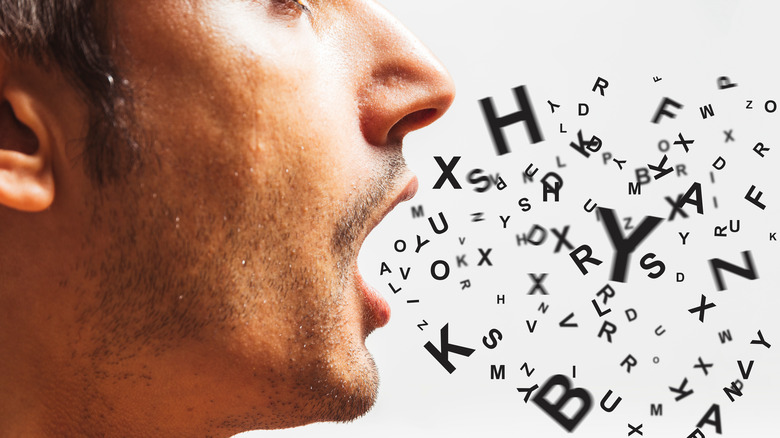The Science Behind Why People Hate The Sound Of Their Own Voice
You might have recently recorded what you thought was the perfect TikTok, YouTube video, or Instagram reel, only to play it back and cringe at the sound of your voice. Or maybe you're a public speaker who has to painstakingly listen to yourself rehearse before giving a big speech. Many people react with disgust at the sound of their own voice when they hear it on recordings, even though they hear it every day when they speak. In one 2005 study, patients and clinicians rated the quality of their voice and consistently rated it more negatively than the objective physicians did (via Clinical Otolaryngology).
Actually, late psychologists Philip Holzman and Clyde Rousey coined the term "voice confrontation" to define this phenomenon back in 1966. Basically, the reason we all cringe so much when we hear our voices recorded and don't do so when we hear ourselves talking is due to differences in what you expect your voice to sound like and what you actually hear when the tapes are rolled back.
One part physiological
When you hear your own voice played back on a recording, sound is traveling through the air and into your ears in a process called "air conduction," per The Conversation. When sound reaches the ear, it vibrates the ear's bones, which sends signals to the nervous system so that it may register them as whatever they are: language, construction downstairs, or your cat meowing outside.
However, when we speak in everyday life, we are listening to sound transferred not just externally through the air but also internally through the bones in our heads (via The Guardian). When sound travels through bone versus air, it is at a much lower frequency because of how the sound waves travel through different mediums. As a result, our voices played back to us typically sound higher and thinner — and more cringeworthy. Voice confrontation occurs when we expect our voice to sound how we typically hear it in everyday life when played back to us, but it actually sounds very different.
One part psychological
Some people may like the sound of their own voice. In one 2013 study in the journal Perception, patients were unknowingly played a selection of vocal samples that included their own. Afterward, they consistently rated their own voices more attractive than others, and in another study by Philip Holzman in 1967, only 38 percent of people could claim the voices played back on a recording were even their own (via the Journal of Personality and Social Psychology).
That tipped off Holzman and Clyde Rousey to the idea that this physiological explanation might not be the only thing at play. In follow-up studies, they also discovered that voice confrontation occurs because we detect aspects of our personalities — what they called "extra-linguistic cues" — like anxiety, indecision, or anger when we speak, and that might make us uncomfortable. That goes back to the expectation versus reality element of voice confrontation. As social beings, it makes us uncomfortable to hear aspects of ourselves played back in our voice that are different than how we imagine ourselves in our own heads.
Voice versus self confrontation
The voice confrontation theory is related to the self-confrontation method of psychology. When used in counseling, this technique can help patients get a better idea of their patterns of behavior from an outside perspective. Essentially, it can provide a motivation for some people to change by showing them how their behaviors and bad habits are perceived by others, according to the American Psychological Association. Originally created by Hubert Hermans in 1992, it is often used for people going through problems with identity, interpersonal conflict, or tough decisions.
This resembles voice confrontation because we are forced to face aspects of our personality that we might not have noticed before — like subtle microaggressions or a tendency to be hesitant with our speech by trailing off at the end of our sentences — and aren't as clear to us when we hear our voices from inside our own heads. Still, the two shouldn't be confused: one is a means of counseling, while the other is something that can happen more subtly when we hear recordings of ourselves.
It may sound worse for some people
In an interview with Time, laryngology professor Martin Birchall said that people with body or gender dysphoria might be particularly taken aback when they hear their voices played on recordings because it could deviate more strongly from what they hear themselves. The sound of one's voice is important in constructing identity, and voice is a gender signifier. If a transgender person hears their voice played back and it sounds more masculine or more feminine than the gender they identify with, it can increase feelings of dysphoria (via Harvard Medicine).
Other groups may be more susceptive to voice confrontation as well. In a 1970 study in Perceptual and Motor Skills, researchers found that people with speech disorders experienced more voice confrontation than people without speech disorders. In another study, Philip Holzman and Clyde Rousey looked at how perceptions of voice recordings differed between men and women. What they found was that women who listened to their voices played back consistently noticed discrepancies, while men did not (via Perceptual and Motor Skills).
What the experts say
Martin Birchall explained voice confrontation to Time by saying that because we get used to the voice we hear in our head, the altered voice that comes back on the recording is a bit of a surprise. "We build our self-image and vocal self-image around what we hear, rather than the reality," he said.
Interestingly, in another study by Philip Holzman and Clyde Rousey, bilingual people were less satisfied by recordings of their voices in their native tongues than in their learned languages (via Journal of Personality and Social Psychology). McGill University neuroscientist Marc Pell told The Guardian that we may compare our voices as we hear them played back to us to how others are thinking of us socially, "leading many people to be upset or dissatisfied with the way they sound because the impressions formed do not fit with social traits they wish to project."
As Holzman and Rousey wrote themselves (per The Guardian), "The disruption and defensive experience are a response to a sudden confrontation with expressive qualities in the voice which the subject had not intended to express and which ... [s]he was not aware [s]he had expressed."





